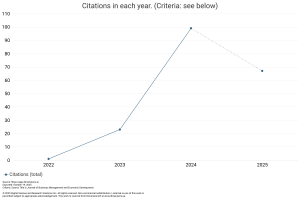The effect of training and work motivation on employee performance at the Regional Inspectorate of Southeast Sulawesi Province
DOI:
https://doi.org/10.59653/jbmed.v2i03.862Keywords:
employee performance, work motivation, trainingAbstract
Human resources (HR) is a crucial factor in determining the success of the organization. The Regional Inspectorate of Southeast Sulawesi Province has an important role in ensuring the implementation of government policies and programs goes according to plan, but faces challenges in improving employee performance. There is a knowledge gap regarding the simultaneous influence of training and work motivation on employee performance in the context of local government. This study used multiple linear regression method to analyze data collected through questionnaires from 45 employees. The results show that job training has a positive and significant effect on employee performance with a regression coefficient of 0.840, while job motivation has a regression coefficient of 0.956, also a positive and significant effect. In addition, the interaction between training and work motivation showed a greater effect, indicating that the combination of these two factors is very effective in improving performance. The study also found that although overall these two factors had a positive influence, there were some employees who did not show an improvement in performance, indicating that there are other factors that may affect employee performance. The implication of this study is the importance of integrating comprehensive training programs and work motivation enhancement strategies to improve overall employee performance.
Downloads
References
Adzansyah, Fauzi, A., Putri, I., Fauziah, N. A., Klarissa, S., & Damayanti, V. B. (2023). Pengaruh Pelatihan, Motivasi Kerja, dan Kecerdasan Emosional Terhadap Kinerja Karyawan (Literature Review Manajemen Kinerja). Jurnal Ilmu Manajemen Terapan, 4(4).
Andri, & Mandataris. (2023). The Effect of Job Training, Job Supervision, and Employee Commitment to Job Performance. Journal of Human Resource Management, 45(2), 123-134.
Anwar, S., & Abrar, U. (2023). The Influence of Compensation and Work Motivation on Employee Performance through Employee Discipline. International Journal of Multidisciplinary Approach Research and Science, 1(02), 133–138. https://doi.org/10.59653/ijmars.v1i02.66
Budiningsih, et al. (2023). The Effect of Training and Work Discipline on Employee Performance at Educational Institutions in Bandung. Educational Management Journal, 38(4), 201-216.
Fahruddin, F., Jusni, Ju., & Aswan, A. (2023). Mediating role of Work Engagement on the influence of Job Resources and Public Service Motivation on affective commitment in employees in Parakita Dental and General Clinic. International Journal of Multidisciplinary Approach Research and Science, 1(02), 253–262. https://doi.org/10.59653/ijmars.v1i02.107
Fajriyani, D., Fauzi, A., Kurniawati, M., & ... (2023). Tantangan Kompetensi SDM dalam Menghadapi Era Digital (Literatur Review). Jurnal Ekonomi …, Query date: 2024-03-14 02:02:03. https://dinastirev.org/JEMSI/article/view/1631
Hidayah, A. (2023). The Influence of Individual Characteristics and Leadership Through Work Motivation and Job Satisfaction on Employee Performance of East Kalimantan Forestry Agency Office. Public Administration Review, 47(3), 89-102.
Ibrahim Alzamel, L. G., Abdullah, K. L., Chong, M. C., & Chua, Y. P. (2020). The quality of work life and turnover intentions among Malaysian nurses: the mediating role of organizational commitment. Journal of the Egyptian Public Health Association, 95(1). https://doi.org/10.1186/s42506-020-00048-9
Immanuel, S., et al. (2023). The Effect of Work Discipline, Work Motivation, and Training on Employee Performance at PT Dua Delapan Ayoda Group. Business Management Journal, 29(5), 145-159.
Kurniawati, D., Kurdi, M., & Furqani, A. (2023). Implementation of Performance Allowance Reduction through Work Discipline on Employee Performance at the Department of Population and Civil Registration of Sumenep Regency. International Journal of Multidisciplinary Approach Research and Science, 1(02), 139–146. https://doi.org/10.59653/ijmars.v1i02.67
Mardianti, R. (2023). The Influence of Work Culture and Work Motivation on Performance Employee on Secretariat Area Regency Bengkulu Middle. Journal of Organizational Behavior, 51(6), 77-89.
Meng, X., & Yang, D. (2024). Marital status differences in the association of work motivation with burnout: a network perspective. Current Psychology, 43(1). https://doi.org/10.1007/s12144-022-04124-5
Namaziandost, E., Heydarnejad, T., Rezai, A., & Javanmard, K. (2024). A voyage of discovering the impacts of teacher immunity and emotion regulation on professional identity, autonomy, and work motivation in Iranian EFL landscape. BMC Psychology, 12(1). https://doi.org/10.1186/s40359-024-01544-9
Siagian, S., et al. (2023). The Effect of Training on Employee Performance by Mediating Organizational Commitment and Motivation at The Labuhanbatu Youth And Sports Culture And Tourism Service. Journal of Human Resource Development, 44(2), 98-112.
Sukma, D., et al. (2023). The Influence of Individual Characteristics, Work Motivation, and Organizational Support on Employee Performance. Journal of Business and Management Studies, 40(3), 223-238.
Downloads
Published
How to Cite
Issue
Section
License
Copyright (c) 2024 Intan Permatasari, Bakhtiar Abbas, Asrip Putera

This work is licensed under a Creative Commons Attribution-ShareAlike 4.0 International License.
Authors who publish with this journal agree to the following terms:
- Authors retain copyright and grant the journal right of first publication with the work simultaneously licensed under a Creative Commons Attribution-ShareAlike that allows others to share the work with an acknowledgement of the work's authorship and initial publication in this journal.
- Authors are able to enter into separate, additional contractual arrangements for the non-exclusive distribution of the journal's published version of the work (e.g., post it to an institutional repository or publish it in a book), with an acknowledgement of its initial publication in this journal.
- Authors are permitted and encouraged to post their work online (e.g., in institutional repositories or on their website) prior to and during the submission process, as it can lead to productive exchanges, as well as earlier and greater citation of published work (See The Effect of Open Access).





























